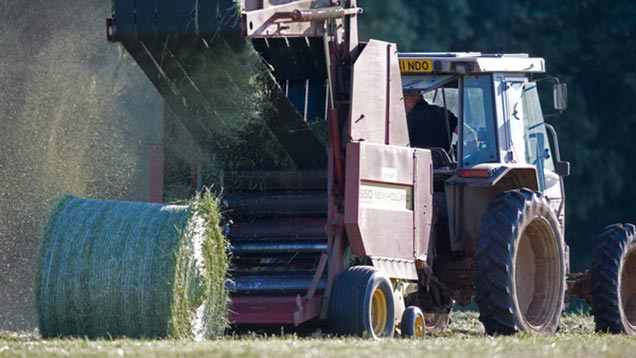Farm safety: How to stay safe as silage season begins
 ©Tim Scrivener
©Tim Scrivener The Health and Safety Executive for Northern Ireland (HSENI) has issued a fresh safety appeal to farmers and contractors as the silage-making season begins.
Farmers are being asked to be safety conscious when making and storing silage to avoid accidents.
Working with high-powered machinery, fatigue due to long hours, poor weather and difficult ground conditions are all factors that increase the chances of accidents occurring.
See also: Top 10 tips on preparing for the silage season
But the HSENI says experience has shown that taking a number of safety measures around key areas will make silage time safer.
The fresh appeal has been made as part of the Farm Safety Partnership’s ongoing “Stop and Think Safe” farm safety campaign, which focuses on the four main causes of death and injury on our farms – slurry, animals, falls and equipment (Safe).
Safety for children on farms
- No child under the age of 13 should ever be carried in the cab of any machine involved in making silage.
- Contractors must not allow children to ride in tractor cabs.
- Children should not be allowed to play around the farmyard or fields when silage is being made.
Operating machinery safely
- All tractors and other equipment need to be properly maintained and in good condition. Breakdowns, due to poor maintenance can lead to delays, adding extra cost and more pressure to an already busy schedule.
- Only competent drivers should be allowed to operate machinery during the silage season and the carrying of passengers should be avoided. All guards must be in place on all equipment – in particular pto shafts – must be properly guarded.
- Clearing blockages by hand should only be attempted when the drive has been switched off and sufficient time has been allowed for the machine to stop completely.
- It is essential to remove keys from tractors during maintenance operations.
- Approved safety cabs or rollbars must be fitted on all tractors.
- Take care when driving on the public road and watch out for other road users especially when entering or leaving fields or yards.
- Keep all lights and indicators in working order.
Working safely with silos
- Silos must never be overfilled as this greatly increases the chance of a tractor or loading shovel overturning when filling or rolling a silo.
- No one should go underneath a silage cover once it has been put in place. The fermenting grass uses up the oxygen in the air under the cover very quickly. Anyone going under the cover risks rapid death due to asphyxiation.
- On open silos with earth embankments, the sides and ends of the silage should be sloped off at a safe angle (less than 45deg).
- On other silos where machines and their drivers can drop 600mm (2ft) or more, strong front-end barriers and guide rails are required.
- Silos with walls should never be filled above the top of the wall. If overfilled the guard rail will no longer be effective and will increase the risk of a machine overturning.
- Excessive filling will overload walls and increase the risk to the operators of machinery.
- Defra has issued guidance on storing silage, slurry and agricultural fuel oil.
Take care near electricity lines
- Be particularly careful when working near overhead power lines. If you use a contractor for silage making, inform them of the location of any overhead lines which you feel may impact on large machinery.
- Remember, self-propelled forage harvesters need a lot of headroom, as do large trailers when tipped in the yard.
- If in doubt about the height of overhead power lines and suitable clearance distances consult with Northern Ireland Electricity (NIE).
To find out more about farm safety, including the HSENI’s Stop and Think Safe campaign, contact the HSENI helpline on 0800 0320 121 or visit the HSENI website
